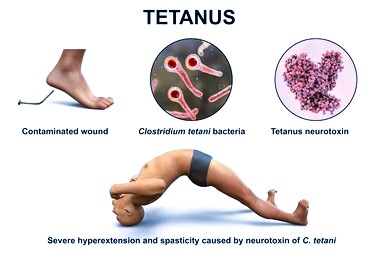Lockjaw: Causes, Symptoms, Treatment, and Precautions
Discover the causes, symptoms, treatments, and precautions for lockjaw. Stay informed and protect your health with our comprehensive guide. #lockjaw #tetanus


Lockjaw, medically known as tetanus, is a serious bacterial infection that affects the nervous system. It is caused by the bacterium Clostridium tetani, which enters the body through a wound or cut. This bacterium produces a toxin that affects the muscles and nerves, leading to muscle stiffness and spasms.
Causes of Lockjaw
The primary cause of lockjaw is the introduction of the Clostridium tetani bacterium into the body. This can occur through various means, such as:
Open wounds or cuts contaminated with soil, dust, or animal feces
Puncture wounds from objects like nails, splinters, or animal bites
Surgical procedures performed in unhygienic conditions
Symptoms of Lockjaw
The symptoms of lockjaw usually appear within a week after the infection. They typically include:
Jaw stiffness and muscle spasms
Difficulty in opening the mouth or swallowing
Stiffness and pain in the neck, shoulders, and back
Muscle rigidity and stiffness in other parts of the body
Fever and sweating
Rapid heartbeat and high blood pressure
Treatment for Lockjaw
Lockjaw requires immediate medical attention and treatment. The primary goals of treatment include:
Administering a tetanus vaccine or booster shot to prevent further infection
Cleaning and dressing the wound to prevent bacterial growth
Administering tetanus immune globulin (TIG) to neutralize the toxin in the body
Prescribing muscle relaxants and pain medications to alleviate symptoms
Providing supportive care, including intravenous fluids and nutrition
In severe cases, hospitalization may be required for intensive care and monitoring. The duration of treatment and recovery can vary depending on the severity of the infection and the individual's overall health.
Precautions to Prevent Lockjaw
Prevention is crucial when it comes to lockjaw. Here are some precautions you can take:
Ensure proper wound care by cleaning and disinfecting any cuts or wounds
Keep up-to-date with tetanus vaccinations and booster shots
Practice good hygiene, such as washing hands regularly
Use protective measures, like wearing gloves and appropriate clothing when working in potentially contaminated environments
Seek immediate medical attention for any deep or dirty wounds
By following these precautions, you can significantly reduce the risk of contracting lockjaw and other bacterial infections.
In conclusion, lockjaw, or tetanus, is a serious bacterial infection that affects the nervous system. It is caused by the Clostridium tetani bacterium and can lead to muscle stiffness and spasms. Immediate medical treatment is necessary, including vaccination, wound care, and medication. Taking precautions to prevent lockjaw is essential in maintaining good health and well-being.
